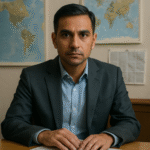Washington, August 10: Bo Hines, the public face of the Trump administration’s push to dominate global cryptocurrency policy, has resigned after just eight months as Executive Director of the White House Crypto Council. His decision, announced late Friday, comes as the administration’s sprawling digital asset agenda is shifting from high-level vision to the grind of implementation.
Hines broke the news in a short statement on X, calling the role “the honor of a lifetime” and thanking both the crypto community and his colleagues, especially AI and Crypto Czar David Sacks. He framed the move as a return to the private sector, but stressed he would remain involved in shaping White House tech policy.
Legislative Wins And Big Ideas
During his tenure, Hines was more than just a figurehead. He championed the GENIUS Act, passed in July, which for the first time created a federal regulatory framework for stablecoins. That alone earned him praise from industry lobbyists who had spent years urging Congress to move beyond enforcement crackdowns.
His council also produced a 166-page blueprint in July titled Strengthening American Leadership in Digital Financial Technology. It pushed for scrapping “regulation by enforcement” in favor of explicit, technology-neutral laws that would apply consistently to banks, exchanges and fintech firms.
Then there was the boldest of his proposals: a Strategic Bitcoin Reserve. Hines floated the idea of revaluing long-ignored U.S. Treasury gold certificates from their outdated fixed price of $42.22 an ounce to today’s market rate — about $3,400. The accounting windfall, he argued, could buy billions worth of Bitcoin without touching taxpayer funds. Economists called it unconventional, even risky. Crypto advocates called it visionary.
A Different Kind Of Successor
Taking over the role is Patrick Witt, currently the council’s deputy director and acting head of the Pentagon’s Office of Strategic Capital. Witt is a seasoned federal operator with a background in defense technology and personnel policy, but unlike Hines, he has no prior track record in cryptocurrency.
That lack of direct industry experience could mark a shift in tone. Witt is expected to keep the administration’s pro-crypto stance, but observers note his priorities may lean toward integrating digital asset policy with broader national security and infrastructure planning.
Stepping Away, But Not Far
Hines isn’t cutting ties completely. He will stay on as a special government employee, advising David Sacks on artificial intelligence projects. That status frees him from some of the ethics restrictions that limit full-time officials, giving him more room to engage with the private sector while still shaping policy from the sidelines.
The timing, however, has drawn speculation. His departure comes with Bitcoin trading above $117,000 and the global crypto market nearing $4 trillion — precisely the environment the administration had hoped to leverage with an aggressive rollout of reforms.
A former Treasury adviser, speaking to The Hindu on background, suggested the move reflected the realities of Washington more than any policy dispute. “Bo is an idea guy, but government is an endurance sport,” the adviser said. “You can have the best playbook in the world, but sometimes you’re more effective calling plays from the stands than being stuck in the huddle.”
Industry On Edge
For the cryptocurrency industry, the handover is a test of momentum. The GENIUS Act still needs detailed regulations to take effect, and the Strategic Bitcoin Reserve proposal will face both political and technical hurdles.
Lobbyists say Witt’s appointment could slow the pace, if only because he will need time to navigate an industry that runs on a completely different clock than the federal bureaucracy. Still, no one is expecting a reversal in direction.
“The question now,” said one blockchain policy advocate to The Indian Express, “is whether the administration keeps its foot on the gas or downshifts to a more cautious gear.”
Stay ahead with Hindustan Herald — bringing you trusted news, sharp analysis, and stories that matter across Politics, Business, Technology, Sports, Entertainment, Lifestyle, and more.
Connect with us on Facebook, Instagram, X (Twitter), LinkedIn, YouTube, and join our Telegram community @hindustanherald for real-time updates.
Former financial consultant turned journalist, reporting on markets, industry trends, and economic policy.
Specializes in South Asian geopolitics and global diplomacy, bringing in-depth analysis on international relations.











